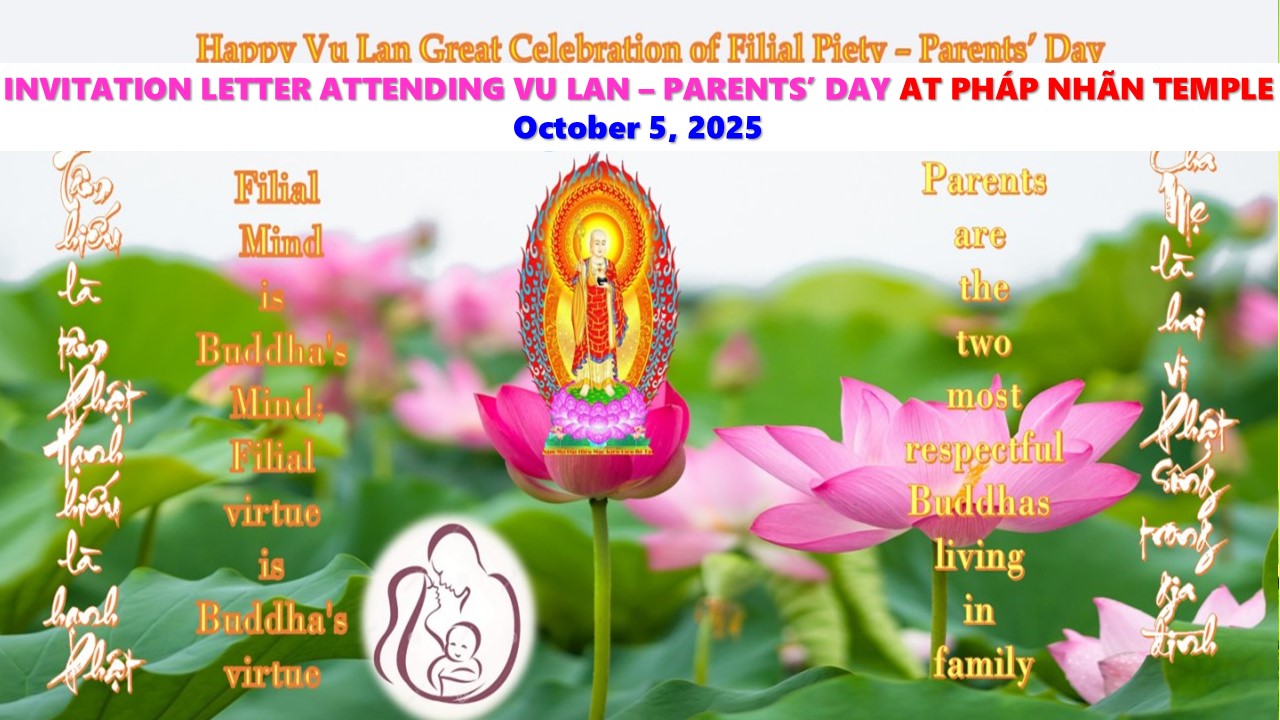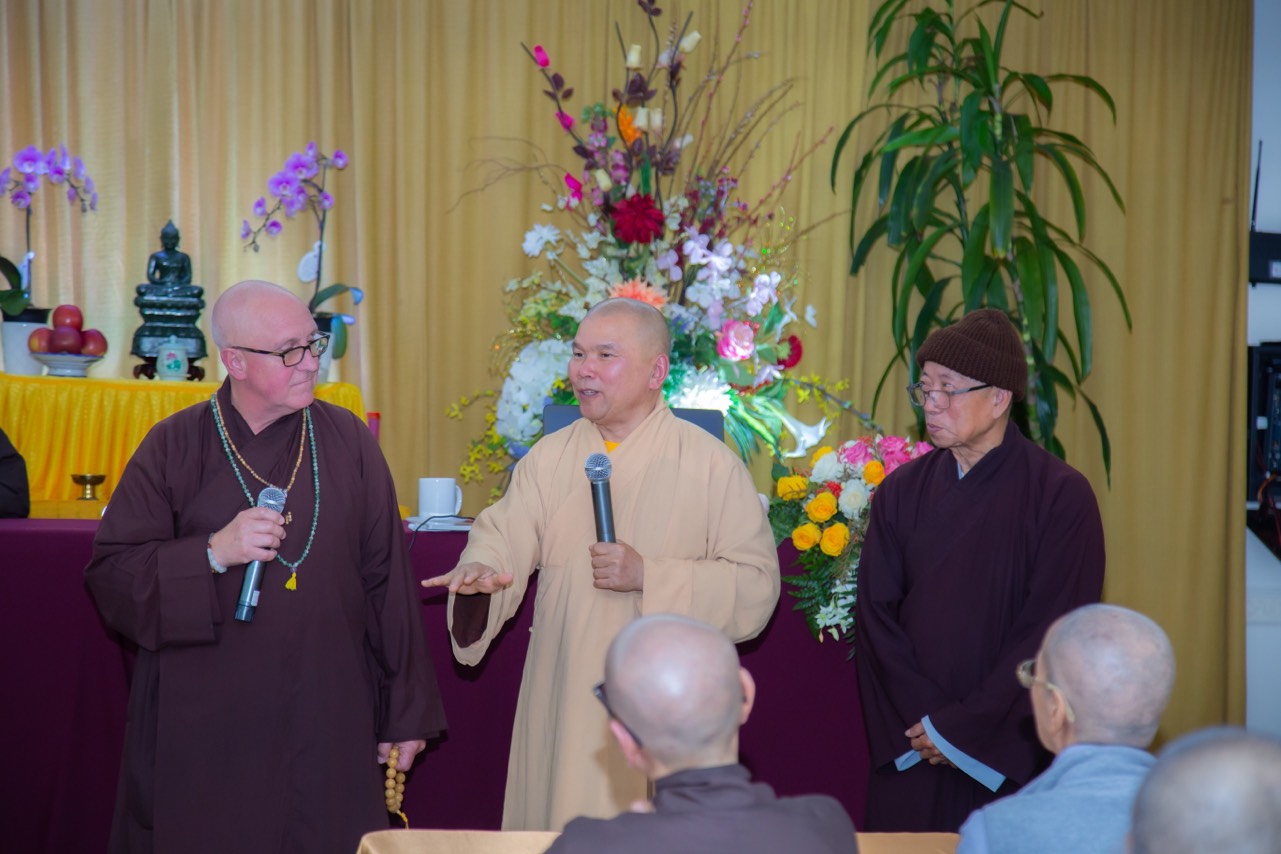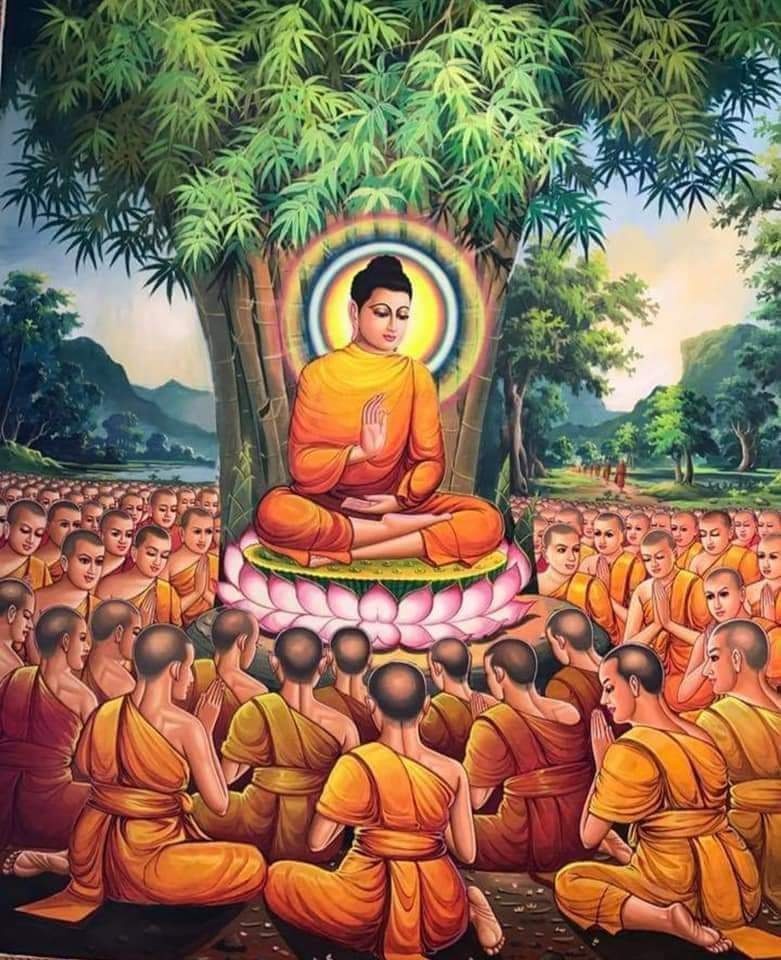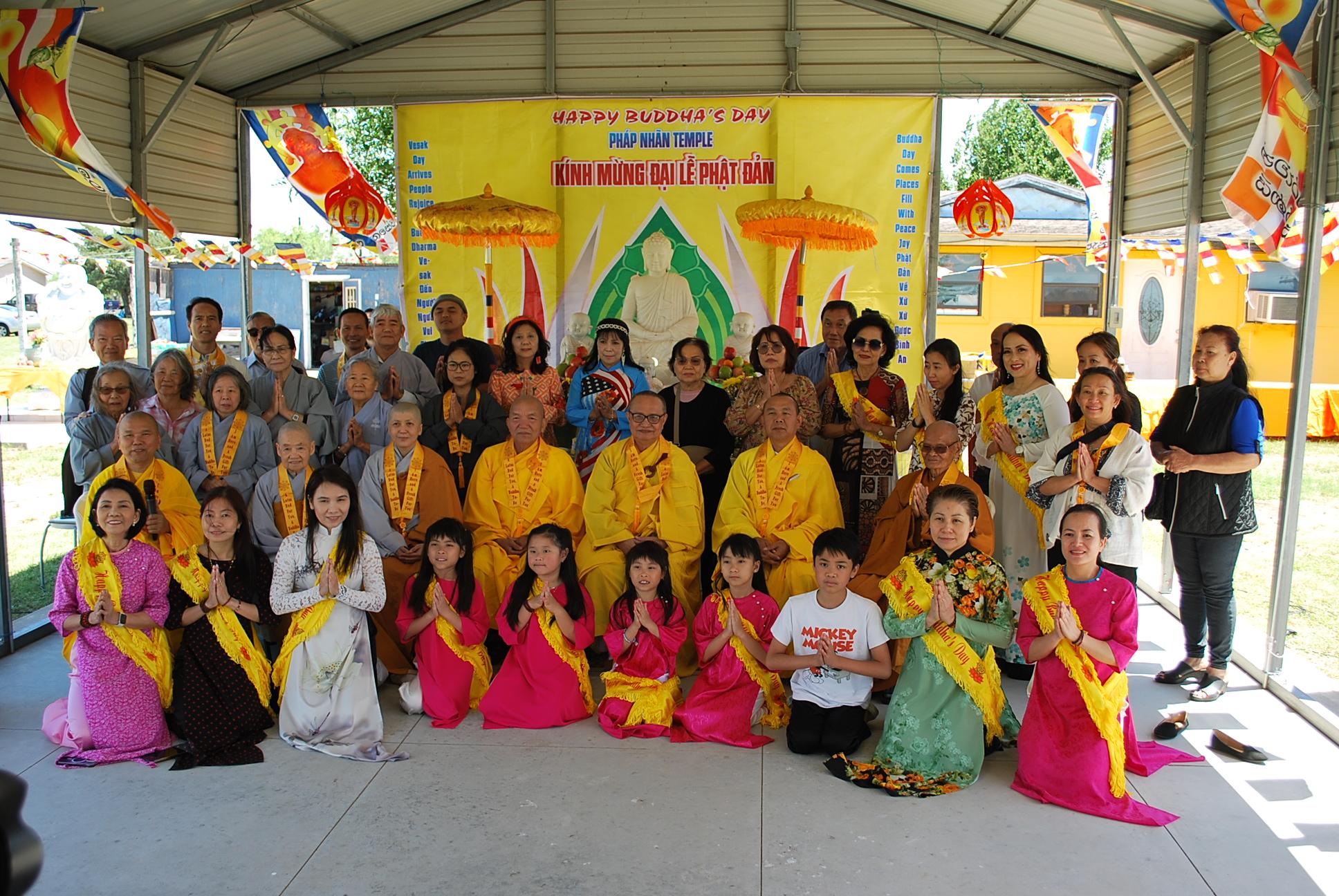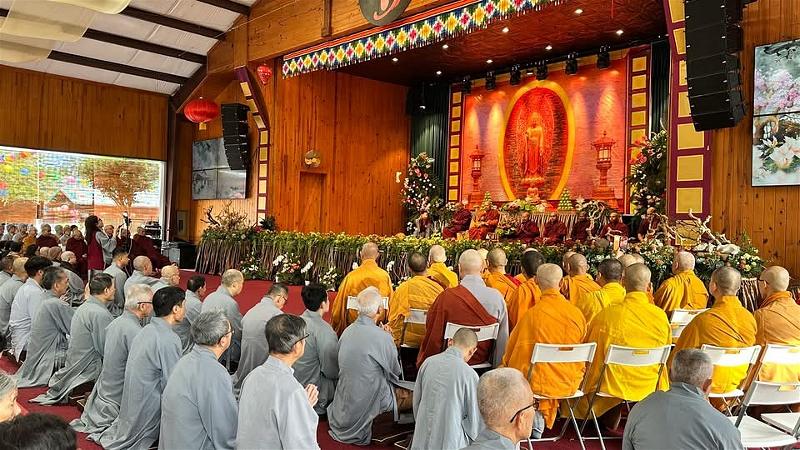
THE FOUR IMMEASURABLE MINDS
The teachings of Buddhism are the teachings of peace, loving-kindness, compassion, and wisdom taught by Sakyamuni Buddha, combined and collected into Sutra Pitaka, Vinaya Pitaka, and Abhidharma Pitaka. Wherever Buddhist teachings are learned, practiced, and applied into daily life, there people can truly obtain peace, joy, and happiness. The Four Immeasurable Minds (Catasso appamaññāyo) preached by the Buddha are one of the practical, valuable, and useful teachings for everyone to practice and bring peace, joy, and happiness to the many all over this planet.
The four immeasurable States of mind consist of:
- Loving-kindness of the immeasurable Mind (sa. Maitry-apramāṇa, pi. Metta appamaññā)
- Compassion of the Immeasurable Mind (sa. Karuṇāpramāṇa, pi. Karuṇā appamaññā)
- Joy of the Immeasurable Mind (sa. Muditāpramāṇa, pi. Muditā appamaññā)
- Equanimity of the immeasurable Mind (sa. Upekṣāpramāṇa, pi. Upekkhā-appamaññā).
The Four Immeasurable Minds (Catasso appamaññāyo) are also called the Catasso Brahmavihāras; Catu is four; Appamaññā is immeasurable, borderless, tolerant, generous, embracing, unlimited, no boundaries, no distinction, etc. Brahma is noble and holy; Vihara is a place, abode, dwelling, a peaceful state of body and mind; so Brahavihara is the peaceful and noble state of the practitioner who practices, permeates, and matures in the Buddha Dharma. Furthermore, Vihara and its literal meaning is the place of cultivation of saints, the dwelling of gods, and its figurative meaning of the dwelling is a state of coolness, serenity, nobility, and peacefulness that comes from the practitioner’s peaceful body and minds with wisdom, virtue, and meditation.
The mind belongs to the spiritual part that is interrelated with the material part, specifically the physical body; the body is of the material part that is closely interrelated with the mind; both the body and mind are never separate from each other like image and its shadow, like wave and its water.
The mind described here means the state of peacefulness, purity, and coolness that never contains sadness, sorrow, grief, lamentation, suffering, etc. Those who cultivate and practice the Four Immeasurable Minds are residing in the abode of the saints or the abode of the gods.
The four immeasurable minds can be briefly stated as the mind of immeasurable loving-kindness, compassion, joy, and the mind of equanimity, which are interconnected and never separate when we cultivate, practice, and benefit other people. However, to understand the Four Immeasurable minds clearly, we can discuss and analyze each part in detail below as follows:
1. Immeasurable Loving-kindness (Metta appamaññā): Metta is the great love likened to sunlight, capable of devoting and embracing all sentient and insentient beings on earth. The mind of loving-kindness in Buddhism includes religious persons or non -religious persons, Buddhists or non-Buddhists, white or black people, yellow or red people, brown people, men or women, American or Vietnamese people, Australian or Japanese people, etc. Indeed, the mind of loving-kindness includes not only humans, but also animals. It never distinguishes the nation, skin color, race, religion, gender, etc.
The mind of loving-kindness in Buddhism is the unconditional love while the secular love is the conditional love, limited in sex love, couple, and marriage. This love takes people to selfishness, narrowness, attachment, clinging, depression, sorrow, etc. We know the mind of immeasurable loving-kindness never contains anger, violence, and hatred. With Dharma practitioners practicing loving-kindness maturely, they have the ability to recognize and transform anger and hatred into love and kindness. In Dhammapada, verse 5, the Buddha taught:
“Hatred is, indeed, never appeased by hatred in this world.
It is appeased only by loving-kindness.
This is the eternal law.”
People with loving-kindness have the ability to control anger, violence, and hatred. People with loving kindness always bring peace, joy, and coolness to all living things and living beings on this earth. People with loving-kindness are always happy and peaceful while walking, standing, lying down, sitting, and working, and even while sleeping, they all sleep well and peacefully.
People with loving-kindness are happy when they live, and when they die, they are peaceful and are reborn in a peaceful realm. People with loving kindness have gentle and likable faces and are close to and loved by everyone. Persons with loving kindness are good friends to everyone and everything in this world. People with a loving-kindness are always blessed and protected by the gods. Indeed, practicing loving-kindness in many directions, every day, we can pray and send loving-kindness to all sentient and insentient beings in the East, West, South, the North, in the direction Above, in the direction Below, Left side, Right side, Front, Behind, etc.
2. Immeasurable compassion (Karuṇā appamaññā): Karuṇā means mercy, energy, and motivation for compassion; Compassion is the great power that makes our minds vibrate when seeing other people suffering. Compassion is soft, smooth, flexible, equal, and altruistic. People with compassion have the ability to help other people alleviate their suffering. Those who have great compassion help other people and never expect others to repay their kindness, gratitude, and thankfulness. People with compassion always have the spirit of commitment, engagement, and service to others.
The Buddha, who had great compassion, saved Mr. Sunita, a dung collector from the poorest caste, and later becoming a monastic disciple of the Buddha.
The Buddha with the great compassion saved Mrs. Ambapālī, a high-ranking prostitute from the Kshatriya caste, to become a female monastic disciple of the Buddha.
The Buddha with the great compassion saved Angulimāla, the murderer, who was determined to give up doing evil, vowed to learn and practice non-violence, enlightened the Buddha’s teachings, and then became the Buddha’s monastic disciple with the Dharma name Ahimsaka, harmlessness.
The Buddha with the great compassion saved King Bimbisāra of the Kshatriya caste, the first King to become a lay disciple of the Buddha.
When he was a lay person, the King ordered hundreds of animals to be killed every month as sacrifices to the gods. When he had the wholesome opportunity to listen to Buddha’s teachings, this King was determined to give up killing and became an ardent animal protector.
The Buddha with the great compassion saved Tisa Gotami, whose unique son was bitten by a snake, enlightened the Buddha’s teachings, understood impermanence, and then become a female monastic disciple of the Buddha. Indeed, people who practice great compassion have the ability to recognize and transform depression, sadness, anxiety, and sorrow. In the Dhammapada, verse 223, the Buddha taught:
Conquer anger by non-anger;
conquer evil by good;
conquer the stingy by generosity;
conquer the liar by truth.
Thus, compassion is the noble compassion that never discriminates against skin color, religion, race, gender, etc.
Compassion always goes with loving kindness and supports each other very closely. We know that compassion in Buddhism is the unconditional love while worldly love is the conditional love always going together with clinging and attachments. The unconditional love brings altruistic joy to oneself and to other people right here and right now in the present life.
3. Immeasurable Joy (Muditā appamaññā): Muditā means the joy in Dharma learning, Dharma practice, Dharma joy, and Dharma happiness. Muditā is a mind that is joyful not only for oneself, but also for others. Joy is not an individual’s own pleasure. Muditā is the altruistic, unconditional, and unattached joy. Joy in Buddhism is not only happy with one’s own success, but also happy with the success of others. Worldly joy is the joy for oneself that leads to selfishness, but the immeasurable joy is the joy for others that leads to selfless and altruism. Joy in practice and transformation is the altruistic joy. If we are happy with the success of others, we have the merit. They have the blessings and we also have the blessings. This we call is the joy of altruism and resonance between ourselves and others.
Joy in doing something good, thinking about something good, and saying something good in the morning, the afternoon, and in the evening, leads benefits to oneself, others, and to the many right in the present life. Joy in cultivating, practicing, and applying the Buddha Dharma in daily life has the ability to bring benefits to oneself and to others right here and now in the present life.
People who practice joy have the ability to identify and transform jealousy and resentment. People who do not have altruistic joy when they see someone succeed can easily become jealous and resentful; Jealousy and resentment can easily lead people to the abyss of discrimination, anger, and hatred. Devadatta, a person without joy, always felt jealous of the Buddha. With enlightened joy, at the end of his life, Devadatta’s jealousy was transformed in his final repentance to the Buddha.
We know that jealousy and hatred lead to conflicts between people and people, religions and religions, countries and countries, etc. Conversely, the mind of joy has the ability to bring happiness and peace between people and people, religions and religions, countries and countries, etc.
People who practice altruistic joy have the ability to fire and burn away jealousy and resentment, bring the joy, happiness, and peace to people. Those who practice altruistic joy always have a noble and happy life. Thus, practicing the joy, we are happy with both the material and spiritual success of others right in the present life.
Loving-kindness, compassion, and joy are very closely related to each other. Joy is the selfless and altruistic joy that is much more difficult to practice than loving-kindness and compassion. When seeing other people succeed, sometimes we are not happy with their success, and vice versa, we feel jealous of them. However, with the practice of altruistic joy, we can identify and transform selfishness and jealousy into altruism and selflessness. Indeed, practicing the altruistic joy has the ability to bring joy and happiness to oneself and other people right in the present life.
In the Dhammapada, verse 249 and verse 250, the Buddha taught:
249. Because people have a happy mind, they make offerings to. On the contrary, a person who is jealous of others being able to eat will not be able to concentrate day or night.
Verse 249. The envious are not at peace
People give as they have faith,
as they are bright with joyfulness.
Who’s troubled over gifts received,
the food and drink that others get,
neither in daytime nor by night
will come to a collected mind.
Explanation: The people give in terms of the faith they have in the receiver. They give in terms of their pleasure. If one were to be jealous when they receive, food and drink, he will never attain tranquility of mind day or night.
250. Those who have been able to cut off, uproot, and destroy those thoughts will be able to concentrate their minds day or night.
The unenvious are at peace
But who has severed envy’s mind,
uprooted it, destroyed entire,
indeed, in daytime and by night
will come to a collected mind.
Explanation: If someone were to utterly uproot and totally eradicate this jealousy, and if it is absolutely destroyed, he will, without any doubt, attain tranquility day and night.
4. Immeasurable equanimity (Upekkhā appamaññā): Upekkhā means letting go, generosity, tolerance, embracing, non-discrimination, non-attachment, non-clinging.
Those who have the mind of equanimity live happily and freely like a strong lion, are not afraid of any sounds and noises in life.
People who practice equanimity are like the wind blowing, are not afraid of getting stuck in the net.
People who practice equanimity are like lush lotus flowers grow out of the mud and muddy water, but are not polluted by the mud and the muddy water. Likewise, people who practice equanimity live in the world, but are not polluted by the world.
People who practice equanimity are like the most solid islands of themselves, are not afraid of all the obstacles and storms of life.
People who practice equanimity are like mighty rhinos taking the most steady and strongest steps forward in life.
A person who practices equanimity is like a bird with two wings, soaring high in the sky to enjoy the vast space. People who practice equanimity always live a free, gentle, serene, and noble life.
People who practice equanimity are always mindful and strong in their thoughts, words, and deeds and have the ability to overcome indifference, apathy, and attachment.
There are the four kinds of equanimity: 1. Equanimity of wealth, 2. Equanimity of the Dharma, 3. Equanimity of fearlessness, and 4. Equanimity of afflictions. With the practice of equanimity, what we help others, we do not see ourselves giving, the thing being given, and the receivers.
Bringing material things to give or donate other people is called equanimity of wealth; Bringing the Buddha Dharma to transmit and spread others is called equanimity of the Dharma; Bringing the body and mind without fear to help other people by thoughts, words, and deeds is called equanimity of fearlessness. For example, the earth is round, we keep saying it is round even if someone says it is square and threatens to arrest us, we still say the earth is round; Bringing our practice to purify and transform afflictions is called equanimity of afflictions.
People who practice equanimity are always happy and free amid praise and blame in life. In the Dhammapada, verse 81, the Buddha taught:
As a mountain of rock is unshaken by wind, so also,
the wise are unperturbed by either blame or by praise.
(Dhammapada, verse 81)
Equanimity and joy always go together and support each other. Successful equanimity is thanks to joy, and successful joy is thanks to equanimity. Loving-kindness and compassion, joy and equanimity are categories that go hand in hand and support each other.
People who practice equanimity are always tolerant, forgiving, and generous, not stuck in “gain and loss, honor and dishonor, praise and blame, happiness and suffering” (Eight winds). These eight winds always make people crazy and miserable.
The Buddha, who practices equanimity, has the ability to identify and transform others, like Ms. Cincā mānaviā pretending to be a pregnant woman to slander the Buddha, like the Brahmin who came to curse the Buddha.
The Buddha gave a very profound example. Today, someone brings you a gift. If you do not accept it, then who does the gift belong to? The Brahmin replied, “Of course, the gift belongs to me. Likewise, I do not accept what you curse me. Whose verbal karma does it belong to?” When he heard the Buddha speak, Mr. Brahmin felt very embarrassed, repented, and asked to become a lay disciple of the Buddha.
In conclusion, the Four Immeasurable Minds (Catasso appamaññāyo) are one of the Buddha’s very practical and useful teachings that are interrelated to other teachings of the Buddha such as the Ten Perfections (Paramitas) of Southern Buddhism or the six Perfections (Paramitas) of Northern Buddhism as follows:
- The Perfection of Generosity
- The Perfection of Virtue
- The Perfection of Renunciation
- The Perfection of Wisdom
- The Perfection of Effort
- The Perfection of Persistence
- The Perfection of Truth
- The Perfection of Determination
- The Perfection of Loving-kindness
- The Perfection of Equanimity
(The Ten Perfections (Paramitas) of Southern Buddhism)
- The Perfection of Generosity
- The Perfection of Ethical Discipline
- The Perfection of Persistence
- The Perfection of Effort
- The Perfection of Meditative Concentration
- The Perfection of Wisdom
(The six Perfections (Paramitas) of Northern Buddhism)
In love and compassion there is wisdom, and vice versa, in joy and equanimity there are loving-kindness and compassion. Practicing the Four Immeasurable Minds correctly, we have the ability to bring peace and benefits to ourselves, families, schools, society, nation, and the world. People who practice the Four Immeasurable Minds have the ability to identify and transform afflictions into Bodhi, enemies into friends, suffering and unhappiness into joy and happiness. People who practice the Four Immeasurable Minds have the ability to build a paradise or extremely happy realm right in this world through Dharma learning, Dharma practice, Dharma understanding, Dharma joy, and Dharma happiness.
We wish you to dwell in peace and be imbued with the Buddha Dharma.
.


